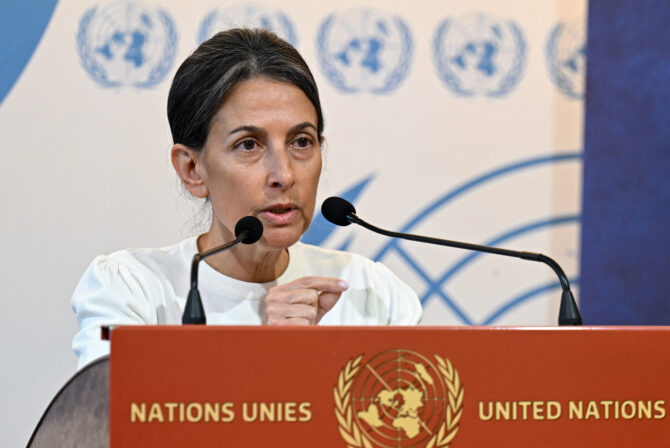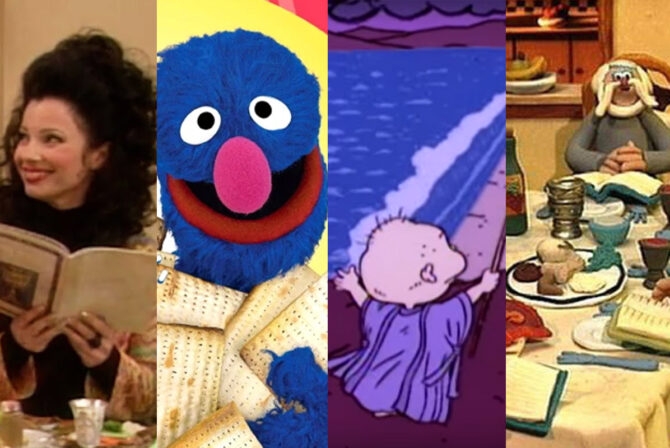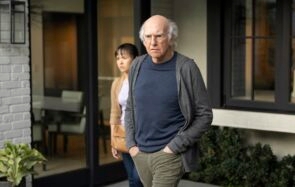While I’ve written before about how Jewish women get the short end of the stick on TV, it’s not like Jewish men do much better. Woody Allen set the standard, and the nebbish, hyper-intellectual loser with girls cliché still sticks (let’s not talk about how the majority of Jewish male characters on TV are married to or involved with non-Jewish women—that’s a whole other topic for another time).
That’s why I was intrigued to hear that ABC was launching a weekly series, “Of Kings & Prophets” which premiered this Tuesday, based on the biblical story of King Saul, that uppity shepherd, David, the prophet Samuel, presumed heir apparent Jonathan, conflicted princess Michal, and assorted other supporting players (no word yet if Batsheba will be making an appearance down the line).
So it’s safe to say no stereotypical New York Jews with their whiny, nasal drawls, proudly un-athletic physiques, and fondnesses for Shiksa goddesses will be showing up in, “Gibeah, the capital of Israel.” Especially when the producers promise to go “as far as we can” with the sex and violence. An ABC executive called the show “muscular.” The network ran a “may not be appropriate for all audiences” disclaimer prior to airing the pilot.
Were we finally going to get some atypical Jewish male representation on TV? And would it be worth watching?
Even casual Bible skimmers know the gist of the story: King Saul attempts to unite the 12 tribes of Israel while also fighting off the Philistines and the Amelekites on the orders of the prophet Samuel. David kills first a lion, then the giant, Goliath, with his slingshot, becomes a favorite of Saul and his son, Jonathan, and marries Saul’s daughter, Michal. Saul comes to believe that David is after his throne and tries to kill him. Michal betrays her father by warning David, much bloody carnage commences. 2000-year-old spoiler alert: David wins.
This version opens with Saul winning a battle over the Philistines, while David wakes from a nap to discover his sheep has been butchered by a lion (clearly, he wasn’t cut out for the demanding shepherding field). David travels to Gibeah to plead his case that, with the death of the sheep, his village shouldn’t be compelled to pay their taxes (even back then, only two things were certain…). His request is not well-received, and David is ordered to be flogged—only for Michal, who just happens to be passing by with her stepmother, the Queen, to intercede.
We know Michal is a feisty, modern-day heroine because earlier her stepmother promises to arrange for Michal as good of a match as she has for her sister.
“A match,” Michal wonders, “Or an alliance?”
“With a tongue like yours, I’m not sure I can arrange either.”
(Please pardon me while I jump around with excitement about the fact that there is a Black, Jewish princess on television, played by Maisie Richardson-Sellers, who will also be in the next “Star Wars” movie! We’re a little starved for representation in that department, and Rashida Jones doesn’t quite cut it. To its credit, the show has cast a myriad of races to play the Israelites, which is not only accurate, but a lot better than the controversial “Gods of Egypt” movie with its all white cast.)
As with all historical works of art, “Of Kings and Prophets” ends up being more about the current time period than the one they’re allegedly depicting. Talk of a unified Israel, followed by Saul’s troops wiping out an entire Amelekite convoy—complete with the mandatory shot of the adorable child wandering about lost in the carnage ala “Schindler’s List”—on the orders of Samuel who insists he is only repeating the word of God, are hardly subtle in their modern day implications. The epithet “Israelite scum” does come up.
Samuel tells Saul that the Lord will not be questioned. But Saul wants to know, “If he cannot be questioned, what is his purpose? The Lord I revere does not slaughter women and children.”
“He made you in his image.”
Samuel may get the final word in (for this episode, at least), but, for me, the exchange was just the start of what I thought were many interesting discussions to be triggered from this particular take on the story.
Purim is coming up shortly. Haman is considered to be a descendant of Amelekites, and one of the 613 original mitzvot (commandments) includes eradicating all Amelekites so that they might not rise again to try and destroy the Jewish people. As with most things Jewish, there are many interpretations of that commandment, which include not actually physically slaughtering women and children. Then again, there are those who insist it must be done as a preventative of future genocides. That’s certainly a topic perennially up for debate.
Collective punishment, genocide, arranged marriages, unreasonable taxation, going against the stated will of God… “Of Kings and Prophets” producers may have been shooting to up the sex and violence ante (though, for the record, I didn’t see anything more extreme than any other network show on at 10 p.m.) but they somehow (inadvertently?) ended up pushing the envelope on what topics can be invoked by the sand and sandals epics popularized by movies like “Spartacus,” “Solomon and Sheba,” and, of course, that Passover granddaddy of them all, “The Ten Commandments.”
This “muscular” show may actually force you to work a muscle not often associated with television—your brain.
Besides, when was the last time you saw a mikveh portrayed on TV?
Read More:
Kids Shouldn’t Be Doing Hours of Homework Every Night (Seriously)
5 Tips for an Awesome Bar/Bat Mitzvah–From a Teen Who’s Been There
After My Miscarriage, This Is How the Mikveh Helped Me Heal







